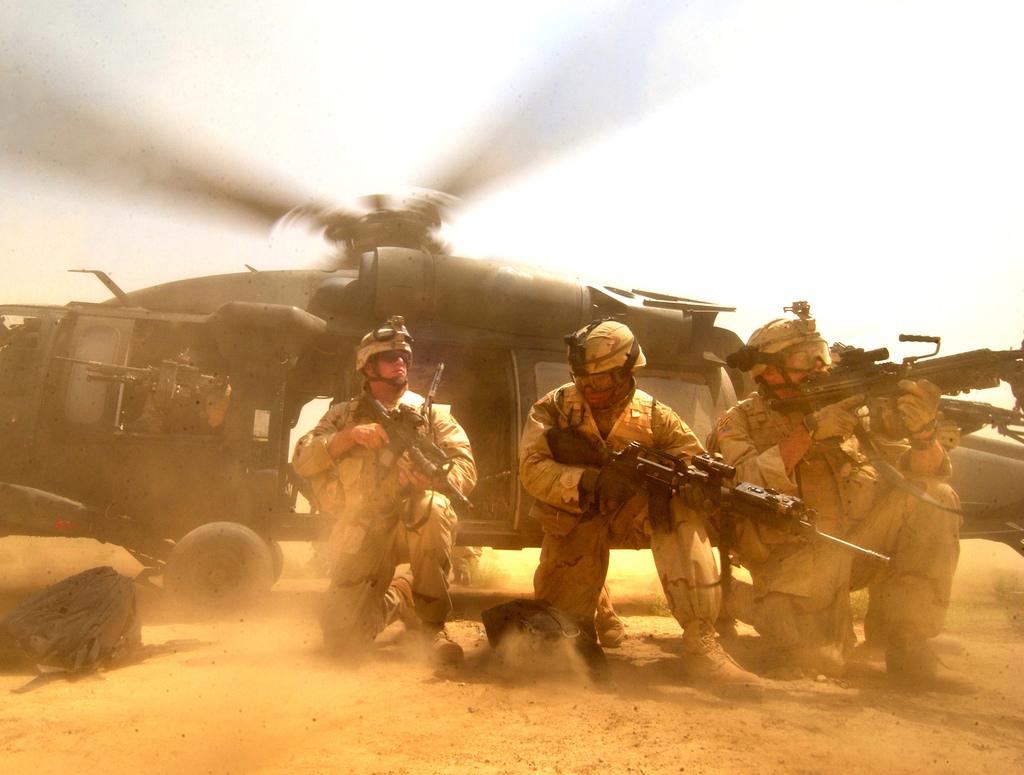Senior Military Official: U.S. Should Withdraw From Iraq Next Year
The memo’s author, Army Col. Timothy R. Reese serves as chief of the Baghdad Operations Command Advisory Team for Multinational Division-Baghdad.
Jul 31, 2020211.7K Shares3.1M Views
U.S. Army Soldiers in Iraq (U.S. Army photo)
A recent memo authored by a senior U.S. military official questions the basic rationale for keeping U.S. troops in Iraq until 2011 as the Obama administration has decided, arguing that U.S. troops have reached a point of “diminishing returns” in training the Iraqi security forces and risk jeopardizing both a future positive relationship with Baghdad by staying for another two and a half years and the safety of U.S. forces.
The short memo, written by Army Col. Timothy R. Reese, chief of the Baghdad Operations Command Advisory Team for Multinational Division-Baghdad, argues that all U.S. troops “smell bad to the Iraqi nose,” and accordingly suffer under laborious operational restrictions placed upon them by the Status of Forces Agreement signed by the U.S. and Iraq in late 2008. In particular, since the June 30 pullback of U.S. forces from Iraqi towns and cities, Reese, a high-ranking liaison to Iraqi security forces, writes that the Iraqi forces have placed “unilateral restrictions on U.S. forces that violate the most basic aspects” of the accord, including a “forcible takeover” of an entry point within the so-called Green Zone. “The security of U.S. forces are at risk,” he writes.
Illustration by: Matt Mahurin
As a result, Reese contends, “we should declare our intentions to withdraw all U.S. military forces from Iraq by August 2010,” a schedule that he says represents not “a strategic paradigm shift, but an acceleration of existing U.S. plans by some 15 months.” There are currently 130,000 troops in Iraq, a number scheduled to remain fairly static until early next year, after which the Obama administration and Reese’s senior theater commander, Gen. Raymond Odierno, intend to remove all combat brigades, leaving between 30,000 and 55,000 troops in Iraq as advisers until December 2011, as allowed in the SOFA.
Yet Reese argues in his memo — evidently written in mid-July — that the United States no longer possesses sufficient leverage to influence a host of Iraqi military and governmental problems, which the administration has cited to justify the presence of U.S. forces through 2011. But he contends that security has improved to the point where even an Iraqi military that he considers poor can keep the county from a much-feared internal collapse without the aid of U.S. forces. “Perhaps it is one of those infamous paradoxes of counterinsurgency that while the ISF [Iraqi security forces] is not good in any objective sense, it is good enough for Iraq in 2009,” Reese writes.
The Iraqi military that Reese advises comes in for a withering assessment. Although he writes that the U.S. can be “justifiably proud” that the Iraqi military has “defeated the organized insurgency,” any opportunity for bequeathing Iraq a professional military free from a “Baathist-Soviet model” is “now long past,” and U.S. forces cannot change the situation by 2011. Reese criticizes the Iraqi military for “endemic” laziness, corruption, nepotism, mistreatment of enlisted soldiers, and worse. The Iraqi Ministry of Defense and its Baghdad Operations Command are untrustworthy, incompetent and unable to “stand up to Shiite political parties,” despite “all the fawning praise we bestow” on both organizations.
Reese’s assessment of Iraqi government performance is even harsher. He writes that reconciliation of the ruling Shiites with former Sunni insurgents and rejectionists is “at a standstill, and probably going backwards,” nor is there movement to resolve Arab-Kurdish tensions in the north. Corruption and incompetence in the ministries is “the stuff of legend,” with Prime Minister Nouri al-Maliki’s much-touted anti-corruption measures a mere “campaign tool.” Essential services like electricity still are unable to meet the needs of Iraqis, and the government does not take “rational steps” to improve them. “The general lack of progress in essential services and good governance is now so broad that it ought to be clear that we no longer are moving the Iraqis ‘forward,’” Reese writes.
The memo, according to several people who have read it, has made its way in defense circles for at least a few days. On Tuesday, a blog called Snuffysmithposted the memo’s contents, which were independently obtained by The Washington Independent. According to GoogleCache, another blog on the conservative Townhall network, The Enchanters’ Corner, posted it on Monday, but the blog is currently blank. Its bio page lists its author as “Tim The Enchanter,” a member of the U.S. Army “on active duty for almost 30 years” who is currently serving “in Iraq as an advisor to the Iraqi security forces.” According to an official bio, Reese received his first Army commission in 1981. Several efforts to reach him were unsuccessful. (As this piece was going to press, the New York Times published a pieceabout the memo as well.)
Reese is known in the Army as a historian as well an armor officer. In 2008, he and a colleague published a well-regarded study of the Army’s experiences in Iraq following the fall of Baghdad until January 2005, titled “On Point II.” Col. Gian Gentile, who led a battalion in Baghdad before the surge, said that Reese’s work on “On Point II” demonstrated that he is a “credible source,” and called his memo a “powerful and important view” of the U.S.’s situation in Iraq.
Douglas Ollivant, a former chief of plans for Multinational Division-Baghdad who left the White House last month as Iraq director, said there was “a grain of truth to the picture he paints,” but said that Reese’s account “is exaggerated, and does not account for Iraqi political reality.” Among other points, Ollivant critiqued Reese for not addressing what accelerating withdrawal “would do to our equipment withdrawal plan” or the “transition to State [Department] control.”
Messages left for a spokesman for Gen. Odierno were not answered by press time.

Rhyley Carney
Reviewer
Latest Articles
Popular Articles

